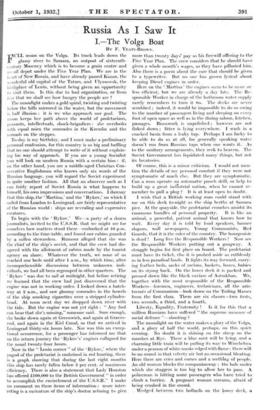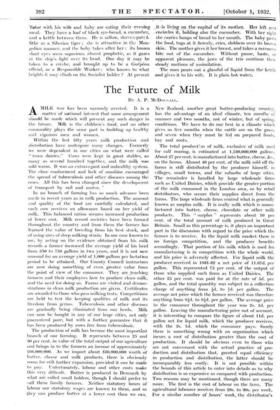Russia As I Saw It
I.—The Volga Boat
BY F. YEATS-BROWN.
FULL moon on the Volga. Its track leads down the glassy river to Samara, an outpost of sixteenth- century Muscovy which is to become a grain centre and an oil depot under the Five Year Plan. We are in the heart of New Russia, and have already passed Kazan, the wonderftil Old Capital of the Tatars, and Ulyanovsk, the birthplace- of Lenin, without being giVen an-OpPortunity to them. Is this due to bad organization, or from fear that we shall see how hungry the people are ? to them. Is this due to bad organization, or from fear that we shall see how hungry the people are ? The moonlight makes a gold spiral, twisting and twisting below the 'hills mirrored in the water, but the movement is half illusion : it is we who approach our goal. The moon keeps her path above the world of proletarians, peasants, intellectuals, shock-brigadiers : she overlooks with equal mien the comrades in the Kremlin and the nomads on the steppes.
To-day is my birthday, and I must make a preliminary personal confession, for thiS country is so big and baffling that no one should attempt to write of it without explain= ing his way of approach. If you are a young Socialist you will look on modern Russia with a certain bias : if, on the other hand, you are a middle-aged Christian Con- servative Englishman who knows only six words of the Russian language, you will regard the Soviet experiment in quite another fashion. All that an observer such as I can fairly report of Soviet Russia is what happens to himself, his own impressions and conversations. I daresay that this-ship, the ` Martina,' and the Rykov,' on which I sailed from London to Leningrad, are fairly representative of the Russian world : ships are revealing and expressive creatures.
To begin with the Rykov.' We—a party of a dozen, journalists, invited to the U.S.S.R. that we might see for ourselves how matters stood there—embarked at 10 p.m. according to the time-table, and found our cabins guarded by a sullen stewardess. Rumour alleged that she was the chief of the ship's soviet, and that the crew had dis- agreed with the allotment of cabins made by the tourist agency on shore. Whatever the truth, we none of us reached our beds until after 1 a.m., by which time, after incomprehensible discussions between unknown . indi- viduals, we had all been regrouped in other quarters. The Rykov ' was due to sail at midnight, but before retiring we learned that the crew had just discovered that the engine was not in working order. I looked down a hatch- way at 2 a.m., and saw gloomy comrades in the bowels of the ship smoking cigarettes over a stripped cylinder- head. At noon next day we dropped down river with the tide.. But the engine was not, yet right : " Any fool can hear that she's missing," someone said Sure enough, she broke down again at Greenwich, and again at Graves- end, and again in the Kiel Canal, so that we arrived in Leningrad thirty-six hours late. Nor was this an excep- tional occurrence, for a passenger has informed me that. on the return journey the Rykov's' engines collapsed for the usual twenty-four hours.
Now in the " Lenin corner ".of the ' Rykov,' where the pagod of the proletariat is enshrined. in red bunting, there is a. graph showing that during the last eight months this.ship has. rarely fallen. below 5 per cent. of maximum efficiency. There .is also a statement that Lady Houston has offered /100,000 to the British Government " in order to accomplish the encirclement of the U.S.S.R." I make no comment on these items of information : more inter- esting is a caricature of the ship's doetor. ,refusing. to give_ more than twenty days' pay as his freewill offering to the Five Year Plan. The crew considers that he should have given a whole month's wages, so they have pilloried him. Also there is a poem about the care that should be given to a typewriter. But no one has grown lyrical about keeping Diesel engines in order.
Here on the ' Martina' the engines seem to be more or less efficient, -but we are already a day late. The Re- sponsible 'Worker in charge of the bathroom water supply rarely remembers to turn it on. The decks are never scrubbed ; indeed, it would be impossible to do so owing to the number of passengers living and sleeping on every foot of open space as well as in the dining saloon, kitchen, passages. Brasswork is unpolished ; hawsers are not flaked down; litter is lying everywhere. I wash in a cracked basin from a leaky tap. Perhaps I am lUcky to be able to do so at all, for generally speaking water doesn't run from Russian taps when one wants it. As to the sanitary arrangements, they reek to heaven. The Soviet Government has liquidated many things, but not its lavatories.
Of course, this is a minor criticism. I would not men- tion the details of my personal comfort if they were not symptomatic of much else. But they are symptomatic. Can a man operate an automatic punch drill, or help to build up a great industrial nation, when he cannot re- member to pull a plug ? It is at least open to doubt: I wish that a British working man could stand with me on this deck to-night as the ship berths at Samara pier. At the quayside, the proletariat crouches amidst its enormous bundles of personal property. It is like an animal, a powerful, patient animal that knows how to wait. Every day it is told by loud speakers, banner slogans, wall newspapers, Young Communists, Red Guards, that it is the ruler of the country. The bourgeoisie is dead ! Long live the Responsible Workers Now see the Responsible Workers putting out d gangway. A struggle begins for first place on board. The proletariat must have its ticket, else it is pushed aside as ruthlessly as in less paradisal lands. It fights its way forward, carry- ing feather beds, sacks of melons, baskets, boxes, babies on.its strong back. On the lower deck it is packed and pressed down like the black caviare of Astrakhan. We, together with the most responsible of the Responsible Workers—foremen, engineers, technicians, all the aris- tocrats of Communism—look down on the Toiling Masses from the first class. There are six classes—two firsts, two seconds, a third, and a fourth.
Liberty, Equality, Fraternity ! Is it for this that a million Russians have suffered " the supreme measure of social defence "—shooting ?
The moonlight on the water makes a glory of the Volga, and a glory of half the world, perhaps, on this quiet evening. No doubt it is shining on the sheep on the marsheS at Rye. There a blue mist will be lying, and a charming little train will be puffing its way to Winchelsca under a pennon of white smoke edged with flame : there will be no sound in that velvety air but an occasional bleating. Here there are cries and curses and a seethlAg of people. An old woman blocks the coMpaniOnway : the bale under which she staggers is too big to allow her to pass. policeman is hitting some passengers whO have tried to climb a barrier. A pregnant woman screams, afraid of being crushed in the crowd.
Wedged between two bollards on the lower deck, a Tatar with his wife and baby are eating _their -evening meal. They have a loaf of black rye-bread, a cucumber, and a kettle between them. He is sallow, shave3-pate3, lithe as a Siberian tiger ; she is attractive in the Mon- golian manner, and the baby takes after her : its brown slant eyes seem sagacious, almost prophetic, as it gazes at the ship's light over its head. One day it may be taken to a creche, and brought up to be a Guep&nt official, or a Responsible Worker : who knows to what heights it may climb on the Socialist ladder ? At present living_on the-capital of its mother. Her left arm ..encircles it, holding-also the cucumber. With her right she carries lumps of bread to her mouth. The baby paws the food, tugs at it fiercely, cries, slobbers over its brown skin. The mothergives it her breast, and takes a ravenous bite out of the - cucumber. Without pause, haste, or apparent pleasure, the jaws of the trio continue their steady motions of assimilation.
The man pours out a glassful of liquid from the kettle and gives it to his wife. It is plain hot water,















































 Previous page
Previous page